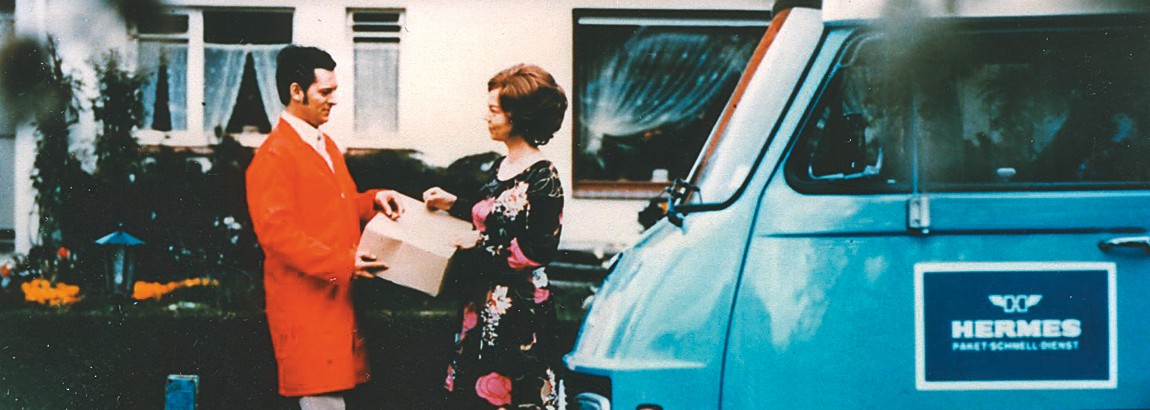Hermes in the 70s
1972
Hermes-Paket-Schnelldienst founded
Following a five-year planning phase in which Otto Versand gradually developed and tested an independent home delivery system, Hermes Paket-Schnell-Dienst GmbH & Co. KG was eventually founded on June 1. Partners in the new company are Otto Versand itself (70%) and Werner Velbinger (30%). Velbinger brought the parcel service of his Werner Velbinger Organisation (WVO) to the company, one of the leading private delivery companies of the time. Velbinger and Erich Lammers of Otto were the first directors of the company. At the end of the year, Hermes managed over 20 depots in Germany.
1973
In the course of the year, 15 further depots started operations
Hermes already processes over 60 percent of parcels delivered by Otto Versand and introduces its new ‘hanging garments’ service. In the build-up to the Christmas parcel, Hermes chalks up its one-millionth delivery; across the year, Hermes drivers put over 10 million kilometres on the road.
1974
New Service, New Client
The number of depots in Germany rises to 40 and Hermes now delivers 87.5 percent of Otto’s parcels. Return collections are introduced in a test phase, a feature that is to become a key component of the Hermes service. Hermes delivers on behalf of plant retailer Horstmann in Elmshorm, the first client that is not part of the Otto Group.
1975
From now on its 'all on board': Hermes Versand Service
The last white areas on the map of Germany have been filled in with the introduction of a delivery service to the islands – by ship or by plane. Three years after being founded, Hermes now provides nationwide coverage. Its 560 employees now process all parcels shipped by Otto Versand. In the course of the year, the company processes its 10 millionth delivery and receives a new perhaps more appropriate name – Hermes Versand Service (HVS) – as well as the new winged logo.
1976
Schwab – a new client
The first Otto Versand subsidiary – Schwab – becomes a client of HVS. This increases annual volumes by nearly 5 million to 16.2 million parcels. The number of employees grows to nearly 800.
1977
Service portfolio enhanced
Effective March 1, HVS takes over the technical repair and service arm from Otto Versand: Hermes Technischer Kundendient is born.
1978
Service portfolio enhanced
HVS and UNION Transport together found the PEGASUS organisation whose aim is to acquire non-Group clients for parcel home deliveries. However, non-Group business only truly begins to flourish in the 1990s.
1979
The Hermes summer mobile
With an average of roughly 700 tours per day by the middle of the year, this year sees around 25.7 million parcels being managed by now 1,040 employees. In order to better exploit the use of its fleet of vans during the summer holiday season, the company equips and rents some of its vehicles as mobile homes. However this test is abandoned after three years.
